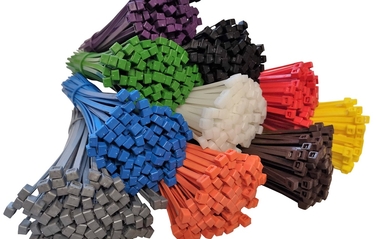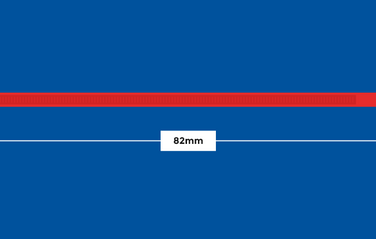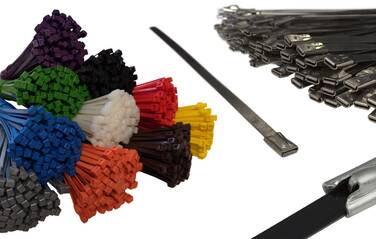Most people have used, or at least come across, a cable tie in their lives, but have you ever wondered about what they're made from? Read on to find out!
Nylon cable ties
In manufacturing and engineering, nylon is used to make a wide range of items, from rivets to cable ties, and is generally available as, amongst other options, nylon 6 and nylon 6/6. At cableties-online, all of our non-stainless steel cable ties are manufactured using nylon 6/6. But what exactly is nylon 6/6 and why is it the best material for our cable ties?
The science
Nylon is the generic name given to a large group of plastics, or synthetic polymers, called polyamides. The numbers 6/6 and 6 refer to the nylon’s individual chemical structure, in particular the number of polymer chains their structure contains. Nylon 6 comes from one monomer (a molecule that can be bonded to other identical molecules to form a polymer - Oxford Languages), which has 6 carbon atoms. By comparison, nylon 6/6 is derived from two monomers, each with 6 carbon atoms and is consequently more durable and stiffer.
Similarities between nylon 6 and nylon 6/6
Not unsurprisingly, being synthetic polymers, nylon 6 and nylon 6/6 share some common features:
- High mechanical damping ability and mechanical strength
- Good machinability
- High toughness, stiffness and hardness
- Good fatigue resistance
- Good impact resistance
- Excellent wear resistance
- Good electrical insulating properties
- No resistance to UV rays
- Lightweight; sometimes used in applications in place of metals
- Excellent fuel and oil resistance
- High water absorption
- Good sliding properties
- Good resistance to high energy radiation from gamma and X-rays
Differences between nylon 6 and nylon 6/6
While nylon 6 exhibits lower mould shrinkage, allowing for more reliable dimensions of parts post-production, in the production of cable ties, nylon 6/6 is far better. Under tests, nylon 6/6 has a lower water absorption rate and a higher crystalline melting point (265°C compared to 225°C), with a higher heat deflection temperature. More importantly, nylon 6/6 has a better tensile strength which is its resistance to breaking under tension, as well as a greater resistance to acids.
Why nylon 6/6 for our cable ties?
As with any manufacturing material, the choice between nylon 6/6 and nylon 6 is dependent on the specific application. Both are cost effective, but factors including processing, appearance, and mechanical properties need to be considered. However, in the manufacturing of cable ties, nylon 6/6 wins every time.
As one of the most versatile thermoplastics, nylon 6/6 exhibits an excellent balance of strength, ductility (the ability to change physically without change) and resistance to heat. The versatility of nylon 6/6 therefore makes it the best choice for situations that requires heat and chemical resistance, where there will be exposure to higher temperatures and where high physical strength is required. Nylon 6/6 meets UL94V-2 flammability ratings and has a working temperature range of minus 40°C to 85°C (minus 40°F to 185°F). When heat stabilised, nylon 6/6 will experience no reduction in physical properties in extended exposure to temperatures up to 125°C. Additionally, when UV stabilised, nylon 6/6 will tolerate continued and extended exposure outdoors.
Super-strong, super-flexible and with an excellent resistance to abrasion, nylon 6/6 is the only choice for our cable ties.
Stainless steel cable ties
In situations where nylon 6/6 cable ties are not suitable, for example in conditions where there is extreme heat or harsh environmental factors, stainless steel cable ties are used. At cableties-online, all our stainless steel cable ties are manufactured from 316 stainless steel. They are ideal for the management of low and high voltage cables and offer the perfect solution for any situation where weather, extreme temperatures, radiation and strength are a consideration. As 316 stainless steel also has a high melting point of 1375 – 1530°C (2500-2785°F), it is accepted as fireproof, making our cable ties both flame retardant and fire resistant. Our stainless steel cable ties are fully compliant with the 18th Edition of the IET Wiring Regulations (BS7671) which came into force on January 1st 2019 and are resistant to salt water, salt water spray, corrosion and chemical attack.








